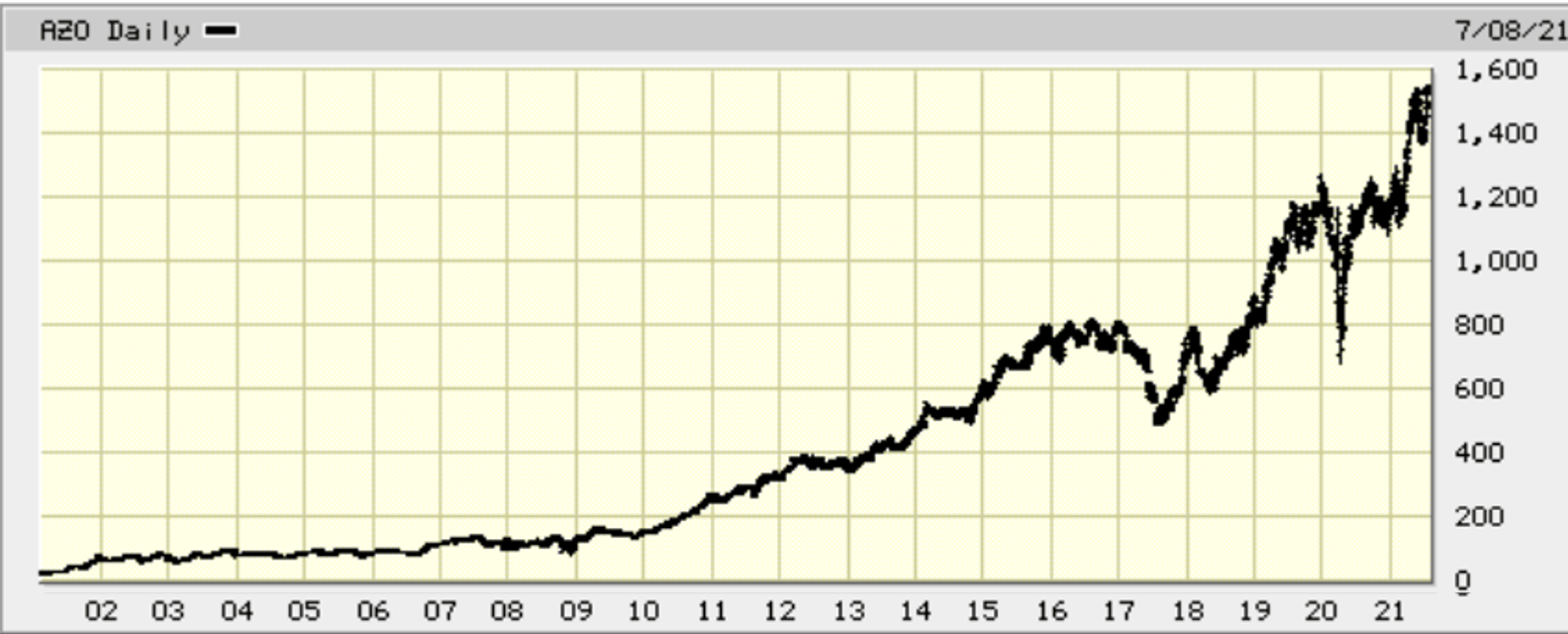Whitney Tilson’s email to investors discussing the mistakes of omission; his AutoZone, Inc. (NYSE:AZO) whiff; and Buffett & Munger‘s comments.
Q2 2021 hedge fund letters, conferences and more
The Mistakes Of Omission
1) These tweets by my friend Yen Liow of hedge fund Aravt Global had me thinking...
AutoZone Whiff
As I look back over my career, I can't think of too many examples in which an investment was so blindingly obvious, but I missed it.
One of the most glaring was auto parts retailer AutoZone. I liked it so much more in early 2001, and I even wrote about it in an article, Three Boring Stocks to Consider. Excerpt:
AutoZone, via its 2,915 stores in 42 states and 13 stores in Mexico, dominates the business of selling car parts and accessories to do-it-yourself customers. The company has solid financials and has demonstrated impressive growth. In FY 00 (ended August 2000), AutoZone had a 6.0% profit margin (up from 5.9% the year before) and 23% return on equity (up from 19% the year before; the figure has ranged from 19% to 31% since 1991). Sales rose 9% in 2000, on a 7.5% increase in stores and a 5% increase in same-store sales. Earnings per share ("EPS") rose 22.7%, thanks to a 9.3% increase in net income and a 10.9% decline in the number of diluted shares outstanding.
Sales and EPS have risen every year since 1990, compounding at an average rate of 21% and 27%, respectively. Analysts project EPS growth of 13% for each of the next two years. Yet AutoZone's stock has been flat for nearly eight years, and at yesterday's close of $27.08, it trades near all-time lows of 13.1 times trailing earnings and 12.0 times analysts' estimates for FY 01.
These characteristics lead me to believe that AutoZone is a good company whose stock is trading at a reasonable price. There are plenty of companies that meet this description. However, I think AutoZone is particularly interesting for three reasons. First, the company is more effectively managing its working capital, freeing up cash. In FY 00, AutoZone reduced its inventory per store by 9%, yet increased sales by 9%. This was the major reason operating cash flow rose 64.6% to $513 million.
Second, AutoZone is using its robust free cash flow – and is even taking on debt – to buy back shares by the bushel. In the past six quarters, the company has spent $898 million repurchasing shares, reducing diluted shares outstanding by 22%. Finally, one has to be concerned about the impact of a slowing economy on any retailer. But AutoZone actually stands to benefit from tough times, as people are both more likely to hang onto their cars rather than buy new ones and are also more likely to do their own repairs rather than pay for a mechanic.
Since then, the stock has risen more than 58 times, from $26.80 to $1,560, as you can see in this chart:
So how much of that did I capture? Precisely none... For reasons I cannot recall, I gave this spectacular idea to my readers – but didn't invest in it myself – ARRRRRHHHHH!
However, it's easy to overlook these mistakes because you tend to forget them – and, if you manage money, your investors never know about them...
Buffett & Munger's Comments
2) Even the greatest investors make this kind of mistake. At the 2004 Berkshire Hathaway (BRK-B) annual meeting, CEO Warren Buffett admitted:
The main mistakes we've made – some of them big time – are: 1) Ones when we didn't invest at all, even when we understood it was cheap; and 2) Starting in on an investment and not maximizing it... We're more likely to make mistakes of omission, not commission.
Berkshire Hathaway vice chairman Charlie Munger elaborated at the 2001 annual meeting:
The mistakes that have been most extreme in Berkshire's history are mistakes of omission. They don't show up in our figures. They show up in opportunity costs.
I don't like mentioning the specific companies, because the – you know, we may, in due course, want to buy them again and have an opportunity to do so at our price. But practically everywhere in life, and in corporate life, too, what really costs, in comparison with what easily might have been, are the blown opportunities. I mean, it just – it's an awesome amount of money.
When I was somewhat younger, I was offered 300 shares of Belridge Oil. Any idiot could've told there was no possibility of losing money, and a large possibility of making money. I bought it.
The guy called me back three days later and offered me 1,500 more shares. But this time, I had to sell something to buy the damn Belridge Oil.
That mistake, if you traced it through, has cost me $200 million. And it was all because I had to go to a slight inconvenience and sell something.
Berkshire does that kind of thing, too. We never get over it.
Best regards,
Whitney














